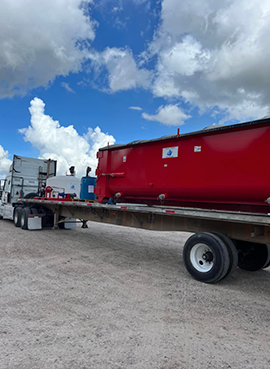The ADS Waste Disposal System is completely shop assembled and, upon delivery, is ready for installation. It is something that companies and organizations will always have to contend with. Collections of sewage and disposal methods are two services that must be provided to residents and businesses. Quite often, those disposal costs can escalate for businesses. What remains unique about our company is that we sell the equipment and use the dewatering equipment daily.
- 569 FM 2540, Van Vleck, TX 77482
- 979-245-5656
Dewatering Equipment
Dewatering Equipment
Dewatering equipment is used to remove excess moisture or liquid from solid materials or sludges, typically in industrial or environmental applications. Dewatering is a crucial process in many industries to reduce the weight, volume, and moisture content of solids, making them easier to handle, transport, and dispose of. There are various types of dewatering equipment available, ranging from simple mechanical devices to advanced technologies. Here are some commonly used types of dewatering equipment:
-
Belt Presses: Belt presses, also known as belt filter presses, use a series of belts to compress and squeeze solids to separate the moisture from the solids. The belts convey the slurry or sludge between rollers or plates, and pressure is applied to remove the liquid. Belt presses are commonly used in wastewater treatment plants for sludge dewatering.
-
Filter Presses: Filter presses use a series of filter plates and frames to separate solids from liquids. The slurry or sludge is pumped into the filter press, and the solids are retained on the filter cloths while the liquid is forced out through the filter plates. Filter presses are used in various industries for dewatering slurries, sludges, and other solid-liquid mixtures.
-
Centrifuges: Centrifuges use centrifugal force to separate solids from liquids. The slurry or sludge is spun at high speeds, and the centrifugal force pushes the solids to the outer edge of the centrifuge, while the liquid is discharged from the center. Centrifuges are widely used in industries such as mining, oil and gas, and food processing.
-
Screw Presses: Screw presses use a screw mechanism to compress and dewater solid materials. The slurry or sludge is fed into the press, and the screw conveys the solids along a dewatering screen or cylinder, separating the liquid from the solids. Screw presses are commonly used for dewatering municipal wastewater sludge, as well as in industries such as pulp and paper, and food processing.
-
Vacuum Filters: Vacuum filters use vacuum pressure to draw liquid through a filter medium, leaving the solids behind. The slurry or sludge is pumped onto a filter medium, and the vacuum pressure pulls the liquid through the filter, leaving the solids for dewatering. Vacuum filters are used in industries such as mining, chemical processing, and pharmaceuticals.
-
Drying Beds: Drying beds are simple dewatering systems that consist of a bed of sand or other porous material onto which sludge or other solid-liquid mixtures are spread. The liquid drains through the bed, and the solids are left to dry and solidify. Drying beds are commonly used in small-scale wastewater treatment plants and in agricultural applications.
-
Decanter Centrifuges: Decanter centrifuges are specialized centrifuges used for dewatering slurry or sludge with high solid content. They use a combination of centrifugal force and sedimentation to separate solids from liquids, making them suitable for applications with high solids concentrations.
These are some common types of dewatering equipment used in various industries. The selection of dewatering equipment depends on the specific requirements of the application, including the characteristics of the solids and liquids being processed, the desired moisture content of the end product, and the throughput capacity needed. Consulting with experts or engineers specializing in dewatering processes can help determine the most appropriate equipment for a particular application.
Know About Us

Request for Quote
Words From Customers
RES would like to THANK EVERYONE for the GREAT SERVICE and professionalism of Aqua-Zyme. We will be back completing the SS at Celanese in the Fall 2021, and will be reaching out to you. I know the weather conditions were not the best – yet you all tried your hardest to service our porta johns. THANK YOU ALL AGAIN!
We can't control the weather, but we can control the schedule, cost, quality, and safety.

